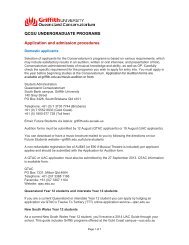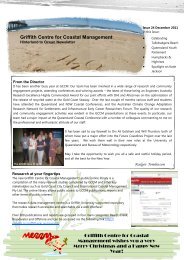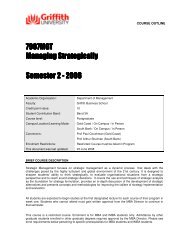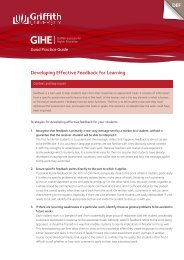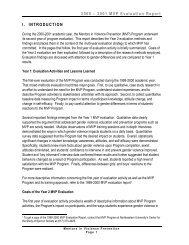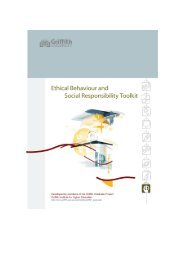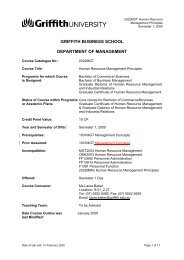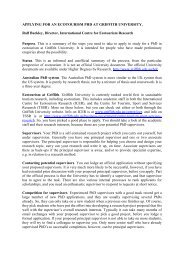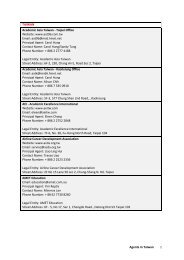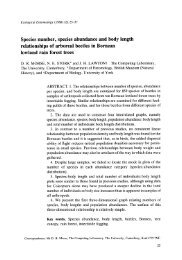Cultural Competency Online Course - Griffith University
Cultural Competency Online Course - Griffith University
Cultural Competency Online Course - Griffith University
Create successful ePaper yourself
Turn your PDF publications into a flip-book with our unique Google optimized e-Paper software.
http://www.uniteforsight.org/cultural-competency/ (accessed 5/02/09)<br />
<strong>Cultural</strong> <strong>Competency</strong> <strong>Online</strong> <strong>Course</strong><br />
<strong>Cultural</strong> competence training and cultural awareness is of paramount importance<br />
for those working in any international or clinical setting. Those participating<br />
abroad are immersed in a culture different from their own and will undoubtedly<br />
therefore experience culture shock and cultural adjustment. Furthermore, those in<br />
any clinical setting must understand language barriers, how to work with<br />
translators, cultural differences and cultural understanding, and trust, among other<br />
cultural concerns.<br />
Unite For Sight's priority is to ensure that our volunteers understand their own<br />
personal impact on those in clinical and international settings. All Unite For Sight<br />
volunteers participating in Volunteer Abroad Programs are required to complete this<br />
<strong>Cultural</strong> <strong>Competency</strong> <strong>Online</strong> <strong>Course</strong>.<br />
Those not currently involved in Unite For Sight are also encouraged to review the<br />
important information contained in this course.<br />
<strong>Online</strong> <strong>Course</strong><br />
Module 1: Culture and the Volunteer<br />
Module 2: Overview of <strong>Cultural</strong> Adjustment and Culture Shock<br />
Module 3: Coping With Culture Shock and Emotional Feelings<br />
Module 4: Slower Pace and "Elastic Time"<br />
Module 5: Language Barriers<br />
Module 6: Working With Translators<br />
Module 7: <strong>Cultural</strong> Differences and <strong>Cultural</strong> Understanding<br />
Module 8: Social Etiquette and Its Importance<br />
Module 9: <strong>Cultural</strong> Beliefs About Service<br />
Module 10: <strong>Cultural</strong> Beliefs About Medical Care<br />
Module 11: Trust<br />
Module 12: Reverse Culture Shock<br />
MODULE 1: Culture and the Volunteer1: Culture and<br />
the Volunteer<br />
Even for those who love to travel to new places, it is not easy to leave the comforts of<br />
home and immerse themselves in a completely foreign, unfamiliar environment. All<br />
volunteers who travel abroad will experience some degree of culture shock. To cushion<br />
this shock and ensure an enjoyable, effective volunteer experience, extensive preparation<br />
is essential. As with any shock, culture shock is largely precipitated by the element of<br />
surprise. Volunteers can minimize culture shock by knowing what to expect when they<br />
arrive at their destination. If you have some understanding of local customs and norms,<br />
your transition to living in your target local community will be much faster and smoother.<br />
You will indeed be living abroad; if you simply consider your volunteer experience a<br />
1
http://www.uniteforsight.org/cultural-competency/ (accessed 5/02/09)<br />
short visit to a foreign country, it will be very difficult to overcome your ethnocentrism<br />
and open your mind to understanding and absorbing the local culture.<br />
“I’ve been abroad a lot of times... [but] I was really excited… to go and really live<br />
somewhere for two months and not just be a visitor. Working with Unite for Sight in<br />
Asikuma last summer was fantastic. It was the most memorable summer I ever had.”(1)—<br />
Jackie Madison, Unite For Sight Volunteer in Ghana<br />
Know that you are not alone in this process. The local organizational staff will be your<br />
guides and assistants for all cultural needs. In this foreign culture, they are experts and<br />
you are a novice. The countless routine daily tasks that you effortlessly undertake in your<br />
home country will likely pose a challenge overseas. Take advantage of staff members to<br />
help you with everything from basic communication and common courtesy to learning<br />
what foods to eat and dealing with people who ask you for money and favours.<br />
Footnotes<br />
(1) “Jackie Madison Speaks About Volunteering With Dr. Baah.” <strong>Online</strong> Video Clip.<br />
Uniteforsight.org. Accessed on 02 December 2008.<br />
http://www.uniteforsight.org/cultural-competency/ (accessed 5/02/09)<br />
It is also essential to realize that we are often blind to elements of our own culture until it<br />
is contrasted with another. Our culture is our default context, or baseline. Remembering<br />
this will help you understand why others sometimes consider your ways to be strange,<br />
and vice versa.<br />
Culture Shock(6)<br />
Who: Anyone and everyone who travels to a foreign culture is susceptible to culture<br />
shock.<br />
What: Culture shock is the holistic reaction to displacement from one’s familiar<br />
environment. Suddenly, you find yourself unable to understand, communicate, and<br />
function effectively. Common symptoms of culture shock include:<br />
1. Feelings of frustration, loneliness confusion, melancholy, irritability, insecurity,<br />
helplessness<br />
2. Unstable temperament and hostility<br />
3. Paranoia<br />
4. Criticism of local people, culture, and customs<br />
5. Excessive concern over drinking water, food dishes, and bedding<br />
6. Fear of physical contact with locals<br />
7. Oversensitivity and overreaction to minor difficulties<br />
8. Changes in eating and sleeping habits<br />
9. Loss of sense of humour<br />
When: Sometimes, transitioning to a foreign culture can have an immediate impact. An<br />
American tourist travelling to a developing country might be instantly alarmed or<br />
disheartened by living conditions that seems perfectly normal and acceptable to the locals<br />
– no private bedrooms or toilet facilities, the use of chewing sticks rather than<br />
toothbrushes, or the conspicuous absence of McDonald’s. Much more common, however,<br />
is delayed culture shock.<br />
“Often when a person takes up residence in a foreign country there’s a period of<br />
excitement and exhilaration when everything seems new and challenging and<br />
fascinating… It is not until this honeymoon period ends that the newcomer begins to<br />
realize that there are endless subtle differences that leave him facing a host of perplexing<br />
problems.”(7)<br />
Where: Culture shock occurs wherever you experience an abrupt change in cultural<br />
environment. Thus, when you travel to a foreign country you can expect to experience<br />
culture shock. More surprisingly, you may experience ‘reverse culture shock’ upon reentry<br />
to your home country, as you will again be suddenly changing cultures. Refer to<br />
module 12 for detailed information regarding reverse culture shock.<br />
Why: Although culture shock is a complex phenomenon, experts agree that the basic<br />
cause of culture shock is the “abrupt loss of the familiar, which in turn causes a sense of<br />
isolation and diminished self-importance.”(8) According to anthropologist Kalvero<br />
Oberg, “Culture shock is precipitated by the anxiety that results from losing all our<br />
familiar signs and symbols of social intercourse. These signs or cues include the thousand<br />
and one ways in which we orient ourselves to the situations of daily life: when to shake<br />
hands and what to say when we meet people; when and how to give tips; how to give<br />
orders to servants; how to make purchases; when to accept and when to refuse invitations;<br />
3
http://www.uniteforsight.org/cultural-competency/ (accessed 5/02/09)<br />
when to take statements seriously and when not… All of us depend for our peace of mind<br />
and our efficiency on hundreds of these cues, most of which we do not carry on the level<br />
of conscious awareness. Now when an individual enters a strange culture, all or most of<br />
these familiar cues are removed. He or she is like a fish out of water. No matter how<br />
broad-minded or full of good will he may be, a series of props has been knocked out from<br />
under him.”(9)<br />
Phases of <strong>Cultural</strong> Adjustment (10), (11)<br />
In spite of its complexity, the process of acculturation is remarkably predictable. <strong>Cultural</strong><br />
adjustment consistently occurs in a series of distinct phases, each with specific<br />
characteristics. This process generally follows a U-shaped curve beginning with a high,<br />
then sinking into shock, and finally recovering to understand and enjoy the new culture.<br />
The Honeymoon Phase: After months of excitement, anticipation, and preparation, you<br />
finally arrive at your destination. Thus begins the phase of initial euphoria, or the<br />
“honeymoon phase.” Everything is new, fascinating and exhilarating. Initially, the<br />
similarities between cultures are more apparent than the differences,(12) and differences<br />
that you do notice seem interesting and exotic. “In this stage, the students [are] still<br />
encapsulated by their back home identities and the adventure abroad was still something<br />
of an unreal experience to them.”(13) When reality sets in and the initial elation wears<br />
off, travellers transition into the crisis phase.<br />
The Crisis Phase: In this phase, you will experience the brunt of the deleterious symptoms<br />
of culture shock. <strong>Cultural</strong> differences become more salient, and you will become<br />
frustrated by difficulties communicating and performing basic tasks. Frustration gives<br />
way to irritability, depression, and other symptoms of culture shock. These sentiments are<br />
compounded by feelings of being an outsider, which may lead to a desire to withdraw.<br />
Many travellers are tempted to cling to their own culture by associating with other<br />
Westerners; this simply extends and intensifies the crisis phase of culture shock.<br />
The Recovery Phase: As you develop a routine and become more comfortable with your<br />
surroundings, you will slip into the recovery phase. You probably will not notice this<br />
transition; the recovery phase comprises a gradual adjustment to your new environment.<br />
You will begin to orient yourself, be able to interpret subtle cues, and regain self-esteem<br />
and a more positive outlook. Most importantly, your perspective will become more and<br />
more balanced; you will become less critical of local culture and more open to integrating<br />
yourself into the community.<br />
The Adjustment Phase: “Eventually you will develop the ability to function in the new<br />
culture. Your sense of ‘foreignness’ diminishes significantly. And not only will you be<br />
more comfortable with the host culture, but you may also feel a part of it.”(14) You will,<br />
in essence, become bicultural. Everyday tasks and conversation will once again become<br />
effortless, and you will develop increasing flexibility and ease in navigating your new<br />
surroundings. Motivation, self-confidence, and your sense of humour will have<br />
rebounded from the lows of the crisis phase, and the balance between living abroad while<br />
holding onto your own cultural identity will have become second nature.<br />
Re-entry: The above cycle is repeated upon return to one’s home country. See module 12<br />
for details about ‘reverse culture shock.’<br />
Go To Module 3: Coping With Culture Shock and Emotional Feelings >><br />
4
http://www.uniteforsight.org/cultural-competency/ (accessed 5/02/09)<br />
Footnotes<br />
(1) Triandis, H. “The Psychological Measurement of <strong>Cultural</strong> Syndromes.” American<br />
Psychologist. 51.4 (1996): 407-415.<br />
(2) LeVine, R. (1984) Properties of culture: An ethnographic view. In Schweder, R. and<br />
LeVine, R., Eds. Culture Theory: Essays on Mind, Self, and Emotion. Cambridge:<br />
Cambridge <strong>University</strong> Press (1984), 67.<br />
(3) Geertz, C. “The Interpretation of Cultures.” New York: Basic Books, 1973, 5.<br />
(4) “Culture Matters: The Peace Corps Cross-<strong>Cultural</strong> Workbook.” Peace Corps<br />
Information and Collection Exchange. www.peacecorps.gov. Accessed on 3 December<br />
2008. <br />
(5) Taken from Diesendruck, G. “What’s culture?” 7 September 2007. Lecture<br />
presentation at Yale <strong>University</strong>.<br />
(6) “How to Cope With Culture Shock.” 29 April 2003. UW Madison College of<br />
Engineering. Accessed on 3 December<br />
2008.<br />
(7) “How to Cope With Culture Shock.” 29 April 2003. UW Madison College of<br />
Engineering. Accessed on 3 December<br />
2008.<br />
(8) Ibid.<br />
(9) Oberg, Kalvero. “Culture Shock.” Presented to the Women’s Club of Rio de Janeiro,<br />
Brazil, August 3, 1954. Accessed on 3 December 2008.<br />
<br />
(10) “How to Prepare: <strong>Cultural</strong> Adjustment.” Center for International Education,<br />
<strong>University</strong> of California, Irvine. www.cie.uci.edu. Accessed on 5 December 2008.<br />
<br />
(11) “<strong>Cultural</strong> Adjustment.” International Office, <strong>University</strong> of California, Berkeley.<br />
Internationaloffice.berkeley.edu. Accessed on 5 December 2008.<br />
<br />
(12) “How to Cope With Culture Shock.” 29 April 2003. UW Madison College of<br />
Engineering. Accessed on 3 December<br />
2008.<br />
(13) Pederson, P. The Five Stages of Culture Shock: Critical Incidents Around the World.<br />
Westport, CT: Greenwood Press, 1995, 77.<br />
(14) “How to Prepare: <strong>Cultural</strong> Adjustment.” Center for International Education,<br />
<strong>University</strong> of California, Irvine. www.cie.uci.edu. Accessed on 5 December 2008.<br />
http://www.cie.uci.edu/prepare/shock.shtml<br />
MODULE 3: Coping With Culture Shock and Emotions<br />
Travelling to a developing country is unlike travelling to other countries in the developed<br />
world – volunteers must be prepared for an emotional roller coaster. In an effort to<br />
5
http://www.uniteforsight.org/cultural-competency/ (accessed 5/02/09)<br />
examine the impact of international volunteer work on the volunteers themselves,<br />
globalization and international development consultant Arif Jinha conducted an in-depth<br />
analysis of personal accounts of volunteer experiences. Although each experience abroad<br />
is personal and unique, many past volunteers give similar accounts of the impact of<br />
seeing poverty and suffering, and the realization of the extent of health disparities and<br />
disease burden.(1) The following is a preview of some distressing emotions you may feel,<br />
as well as ways to cope.<br />
Overwhelming Sadness<br />
It is often shocking when someone experiences poverty for the first time. In his thesis,<br />
Arif Jinha cites personal accounts of poverty discussed by Canadian volunteers in their<br />
online blogs:<br />
“It’s beautiful here, there are many mountains/hills and it is green everywhere but it<br />
doesn’t take long to see the poverty.”–Karen's blog on Kenya(2)<br />
“I was also bombarded with images of poverty…which, being my first time in a<br />
developing country… hit me pretty hard. It’s not really something you can prepare<br />
yourself for… seeing it first hand is completely different from reading about it.”–Angela's<br />
blog on Kenya(3)<br />
Seeing the conditions people live in will likely elicit sadness or feelings of helplessness.<br />
Furthermore, observing extreme poverty “inevitably leads to comparisons and new<br />
insight into one’s own state of comparative privilege in the world,”(4) which can give<br />
way to feelings of intense guilt.<br />
One of the best ways to cope with the sadness of poverty is to look for happiness in these<br />
communities.<br />
“Obviously compared to us they don’t have the same richness in regards to material<br />
possessions, but I found so much of the opposite. There was so much more richness in<br />
terms of family, mothers taking care of all their children and fathers coming home and<br />
playing with their children. There was a lot of time after school for children to play, and<br />
another thing that I noticed was that children hold hands and touch each other and play,<br />
and that was something that perhaps… I work in elementary schools and you don’t see<br />
that as much as that was great to see, and they were full of life and full of laughter – and<br />
in that sense I thought that this community is so rich.”–Candice's blog on Tanzania(5)<br />
It also helps to remember that poverty exists whether you pay attention to it or not. By<br />
volunteering, you have made the decision to do something about it. While abroad, you<br />
can have a real impact on the lives of those living in poverty, but only if you are not<br />
paralyzed by sadness.<br />
The “Mzungu” Factor<br />
Being an outsider is never easy, but there are additional challenges associated with being<br />
a Western traveller in the developing world. Regardless of your status in your home<br />
country, you will be seen as wealthy; indeed, in this society you are. People may ask you<br />
for favours, money, and more, all because they see you not only as the solution to their<br />
health ailments, but as the solution to their poverty. This added pressure of being a<br />
Western visitor has been termed the “mzungu factor.”(6)Mzungu is the Swahili word for a<br />
white person, but is applicable to all Western foreigners.<br />
6
http://www.uniteforsight.org/cultural-competency/ (accessed 5/02/09)<br />
In the clinic, patients will likely assume you have clout with the medical providers. You<br />
may be approached by patients with very moving stories who will ask you for favours,<br />
whether it be extra medication, an impromptu visit with the doctor, or even monetary<br />
assistance. You will also experience the mzungu factor away from the clinic. People may<br />
allow you to take their picture, offer to carry your bags, or otherwise extend a helping<br />
hand without first telling you that they expect some money in return.(7) In addition to<br />
being asked for money directly, you will likely be quoted higher prices for goods at<br />
markets and shops.<br />
“Many people see the expatriate (you) as being very wealthy and therefore capable of<br />
affording everything. Expatriates tend to get higher quotations for goods and services<br />
without being given the opportunity to make a cheaper choice.”(8)<br />
Lastly, the mzungu factor extends beyond monetary wealth. It is very difficult for citizens<br />
of the developing world to secure travel visas, and some may therefore see you as a ticket<br />
to the Western world. For this reason, be careful about giving out personal contact<br />
information.<br />
Experiencing the mzungu factor can be upsetting. You may feel taken advantage of, or<br />
that you are being treated unfairly. The pressure of patients’ requests can become an<br />
unwelcome burden, making it tempting to minimize contact with them. Feelings of being<br />
an outsider and not fitting in will only be compounded by the mzungu factor. Keep in<br />
mind that you are not the first to experience these emotions, and that those who have gone<br />
before you often have valuable advice. For instance, in a web log entry entitled “Dealing<br />
With Being White,” international volunteer Karen explains how she coped with the<br />
mzungu factor in Kenya by focusing on forming relationships rather than handing out<br />
money. “I’m here to build friendships with Kenyans that will last a life time,” she wrote.<br />
“Every person I meet will hopefully learn something from this Mzungu, just like I will<br />
learn from them. It’s not money, but perhaps it’s something more.”(10) You will not be<br />
able to meet everyone’s demands, so you will have to learn to politely decline requests.<br />
Local staff and organizers will also be able to help you navigate any uncomfortable or<br />
unfamiliar situation, so do not hesitate to ask for help.<br />
Futility<br />
(9)<br />
7
http://www.uniteforsight.org/cultural-competency/ (accessed 5/02/09)<br />
Because the challenges of poverty are so overwhelming, at some point you may feel<br />
helpless, or that your hard work isn’t making a difference.<br />
“There are times for all volunteers when the difficult conditions under which they live<br />
and work prove upsetting. Many experience intense feelings of discouragement and<br />
futility, especially [early on].”(11)<br />
While feelings of powerlessness are disheartening, remember that big change is nearly<br />
always the aggregate of relatively small steps forward. It is also important to focus your<br />
perspective on a localized set of goals. You will not solve global poverty in a period of<br />
weeks, but you can make an enormous impact on the lives of those in the community you<br />
work in.<br />
In addition to your work abroad, one of the best ways for you to maximize your impact is<br />
to continue your advocacy work upon returning to your home country. As international<br />
development expert Jeffery Sachs observes, two overwhelming barriers preventing the<br />
wealthy developed world from solving global poverty are that “people think there are no<br />
solutions other than what we are doing, and that we are doing enough.”(12) After having<br />
spent several weeks working abroad, you will have the knowledge and credibility to<br />
change such thinking. If you take the time to spread awareness and galvanize others, you<br />
will be giving the poor and powerless a voice. This is no small impact.<br />
In the same vein, do not forget the importance of the personal growth you undergo during<br />
your volunteer experience. You will have grown emotionally and professionally, and<br />
gained clinical and cross-cultural competence. You will carry this newfound global<br />
citizenship with you in your future endeavours, which may very well include continued<br />
work in international development.<br />
“The student’s own advocacy throughout is acting, helping, and empowering,<br />
understanding and speaking out. Their experience in the field became commitment and in<br />
returning from these experiences, the students made commitments to be part of<br />
international health in their careers and throughout their lives… The local impacts of a<br />
two-month student experience may be modest, but the impact on creating professional<br />
global citizens who will come back again and again in the future to this type of work [is]<br />
very significant.”(13)<br />
8
http://www.uniteforsight.org/cultural-competency/ (accessed 5/02/09)<br />
General Tips for Coping with Culture Shock and<br />
Emotions(14),(15),(16)<br />
1. Travel in a spirit of humility and with a genuine desire to meet and talk with local<br />
people<br />
2. Realize that what you are going through is normal, and temporary<br />
3. Take care of yourself – eat well, exercise, and get enough sleep!<br />
4. Do not take anything too seriously – an open mind is the beginning of a great<br />
international experience<br />
5. Do not let others get on your nerves – you have come a long way to learn as much<br />
as you can, to enjoy the experience, and to be a good ambassador for your country<br />
6. Maintain flexibility, an open mind, and your sense of humour<br />
7. Set realistic, short-term goals, and realize that periodic failures are inevitable<br />
8. Carefully review your preparation materials – those who have gone before you<br />
have invaluable advice<br />
9
http://www.uniteforsight.org/cultural-competency/ (accessed 5/02/09)<br />
9. Do not judge the people of a country by stereotypes, or by the one person with<br />
whom you have had trouble – this is unfair to the people as a whole<br />
10. Cultivate the habit of listening and observing, rather than merely seeing and<br />
hearing<br />
11. Remember that other people’s different conceptions of time, manners, privacy,<br />
humour, and tact are just that - different, not inferior<br />
12. Be aware of the feelings of local people to prevent what might be offensive<br />
behaviour. For example, photography must be particularly respectful of persons.<br />
13. Spend time reflecting on your daily experiences in order to deepen your<br />
understanding of your experiences.<br />
Footnotes<br />
Module 4: Slower Pace and Elastic Time >><br />
(1) Jinha, A. “Students in a Globalized World: Impact of Volunteer Work in Developing<br />
Countries on Students of the Health Professions.” Honors Undergraduate Thesis,<br />
<strong>University</strong> of Ottawa (2006). Accessed on 8 December 2008.<br />
<br />
(2) Karen’s blog, as quoted in Jinha, 2006.<br />
(3) Angela’s blog, as quoted in Jinha, 2006.<br />
(4) Jinha, 2006.<br />
(5) Candice storytelling, as quoted in Jinha, 2006.<br />
(6) Jinha, 2006.<br />
(7) Clarke, J. “Cushioning <strong>Cultural</strong> Shocks: Guidelines For Volunteers To Ghana.”<br />
Uniteforsight.org. Accessed on 10 December 2008.<br />
<br />
(8) Ibid.<br />
(9)Adapted from “Culture Matters: The Peace Corps Cross-<strong>Cultural</strong> Workbook,” p. 163.<br />
Peace Corps Information and Collection Exchange. www.peacecorps.gov. Accessed on<br />
12 December 2008.<br />
<br />
(10) Jinha, 2006.<br />
(11) “Living Conditions and Volunteer Lifestyles in Cameroon: Rewards and<br />
Frustrations.” Peacecorpswiki.org. Accessed on 11 December 2008.<br />
<br />
(12) Epstein, J. “Economist urges Americans to do more to fight world poverty.” San<br />
Francisco Chronicle. 8 May 2005: A-4. Accessed on 11 December 2008.<br />
<br />
(13) Jinha, 2006.<br />
10
http://www.uniteforsight.org/cultural-competency/ (accessed 5/02/09)<br />
(14) “How to Prepare: <strong>Cultural</strong> Adjustment.” Center for International Education,<br />
<strong>University</strong> of California, Irvine. www.cie.uci.edu. Accessed on 5 December 2008.<br />
<br />
(15) “<strong>Cultural</strong> Adjustment.” International Office, <strong>University</strong> of California, Berkeley.<br />
Internationaloffice.berkeley.edu. Accessed on 5 December 2008.<br />
<br />
(16) What is Culture Shock? And How to Adjust in a New Culture.” Consortium for<br />
International Education & Multicultural Studies. Accessed on 11 December 2008.<br />
<br />
MODULE 4: Slower Pace and Elastic Time<br />
One of the first cultural differences volunteers notice about the developing world relates<br />
to notions of time, timing and timeliness. Compared to the Western lifestyle, the pace of<br />
life in developing countries is much slower, punctuality is less highly valued, and<br />
schedules and appointments are understood to be flexible. The Peace Corps has<br />
characterized these two differing concepts of time, which are really two poles of a<br />
continuum:<br />
1. Monochronic time: Time is the given and people are the variable. The needs of<br />
people are adjusted to suit the demands of time – schedules, deadlines, etc. Time<br />
is quantifiable, and a limited amount of it is available. People do one thing at a<br />
time and finish it before starting something else, regardless of circumstances.<br />
2. Polychronic time: Time is the servant and tool of people. Time is adjusted to suit<br />
the needs of people. More time is always available, and you are never too busy.<br />
People often have to do several things simultaneously, as required by<br />
circumstances. It’s not necessary to finish one thing before starting another, nor to<br />
finish your business with one person before starting in with another.(1)<br />
To summarize, in monochronic societies people work around schedules, whereas in<br />
polychronic societies, schedules are worked around people. Although the polychronic<br />
notion of time may seem new and obscure, it is actually widespread across cultures and<br />
countries.<br />
Slow Progress<br />
People may jokingly tell you that you must learn to run on “African Standard Time.” The<br />
shift from a monochronic to a more polychronic time scheme can bewilder and frustrate<br />
volunteers.<br />
“Americans are notorious for being doers, activists. One of the most common complaints<br />
of Peace Corps Volunteers around the world is how long it takes to ‘get things done’ in<br />
the host country. Sometimes the complaint appears in comments about the slow pace of<br />
life overseas. This American urge to do something, however, is somewhat inconsistent<br />
with the Peace Corps mandate to help other people do something.”(2)<br />
With a goal of building local capacity, volunteers are indeed helping other people learn to<br />
“do something.” This doesn’t mean that local community members will be working while<br />
volunteers laze around. In other words, don’t make the mistake of confusing slower pace<br />
of life with easier lifestyle:<br />
11
http://www.uniteforsight.org/cultural-competency/ (accessed 5/02/09)<br />
“What about the ‘work?’ You’ll notice I put that word in quotation marks, not because<br />
you won’t work very hard here. It’s just that you won’t understand why it’s so hard. In<br />
the States, hard work is 60 hours a week. Here it’s waiting for things to happen, watching<br />
them happen at a pace that’s absurdly slow by the standards you’re used to, and then<br />
trying to work the way people work here. Otherwise you won’t be working with them,<br />
you’ll be working for them.”(3)–Peace Corps Volunteer, Madagascar<br />
Waiting<br />
In your home country, making others wait is probably considered disrespectful and rude.<br />
After all, isn’t their time valuable? Who are you to waste it? When you are abroad,<br />
however, you can expect to do a lot of waiting. Don’t be insulted if others make you wait;<br />
it is not because they are being rude, or because they think you are insignificant. Rather, it<br />
is simply a symptom of a culture with a more relaxed attitude toward timeliness and<br />
schedules.<br />
(4)<br />
Patience, flexibility and an open mind are the keys to succeeding as a volunteer in a less<br />
monochronic society. For instance, rather than allowing herself to become frustrated with<br />
the inefficiencies of a slower daily schedule, Unite For Sight volunteer Jackie Madison<br />
embraced the different style of time in Ghana:<br />
“It was sometimes hard to get used to a very different schedule, especially for a college<br />
student who is used to going ‘boom, boom, boom,’ and working really fast all the time.<br />
[The] Ghanaian way of life… is a bit slower and more calm, but I think in general that’s<br />
a great way to spend the summer. I had a fantastic time slowing down for a while.”(5)<br />
Module 5: Language Barriers >><br />
12
http://www.uniteforsight.org/cultural-competency/ (accessed 5/02/09)<br />
Footnotes<br />
(1) “Culture Matters: The Peace Corps Cross-<strong>Cultural</strong> Workbook,” p. 104. Peace Corps<br />
Information and Collection Exchange. www.peacecorps.gov. Accessed on 11 December<br />
2008. <br />
(2) “Culture Matters: The Peace Corps Cross-<strong>Cultural</strong> Workbook,” p. 148.<br />
(3) As quoted in “Culture Matters: The Peace Corps Cross-<strong>Cultural</strong> Workbook,” p.136.<br />
(4) As quoted in “Culture Matters: The Peace Corps Cross-<strong>Cultural</strong> Workbook,” p.106.<br />
(5) “Jackie Madison Speaks About Volunteering With Dr. Baah.” <strong>Online</strong> Video Clip.<br />
Uniteforsight.org. Accessed on 11 December 2008.<br />
<br />
MODULE 5: Language Barriers<br />
Even in countries where the national language is English, people living in extreme<br />
poverty in rural villages often do not speak or understand English. While the local staff<br />
will speak English and can act as translators, it will initially be frustrating not to be able<br />
to speak directly with patients. This is part of culture shock. As with many of the<br />
frustrations of culture shock, the best approach is to step back and calmly embrace what is<br />
new and unfamiliar. You will learn that smiles and hand gestures go a long way in<br />
communicating and connecting with people. You may even discover new joys and<br />
profundity that you otherwise would never have known. As Pradeep Mettu, Unite For<br />
Sight Volunteer in Chennai, India, wrote about his experience: “The language barrier<br />
ultimately made the experience even more meaningful. Since communication was always<br />
an issue, I learned a great deal about the human touch and the intangibles that create a<br />
universal language between the health care provider and the patient."<br />
Module 6 – Working with Translators(1),(2)<br />
In order to communicate with people who speak a different language, you will work with<br />
translators. Conducting an interview through an interpreter can be tricky, so to ensure<br />
professionalism and clear understanding, you should adhere to the following protocols:<br />
Protocol for interacting with the patient<br />
1. Introduce yourself and the interpreter before beginning the interview.<br />
2. Speak directly to the patient, as if you were interviewing an English-speaking<br />
patient<br />
3. Pay attention to nonverbal cues<br />
4. Make an effort to learn basic phrases in the local language, such as greetings and<br />
introductions<br />
5. Speaking through an interpreter can be confusing, but repetition will confirm<br />
understanding. Regularly repeat back to the patient what he or she tells you. This<br />
will let them know you are engaged, and that you understand their complaints.<br />
You should also ask patients to repeat back to you any instructions you give to<br />
make sure they have understood.<br />
Protocol for interacting with the interpreter<br />
13
http://www.uniteforsight.org/cultural-competency/ (accessed 5/02/09)<br />
1. Speak more slowly than usual, and use simple language. Although they speak<br />
English, your interpreters may not be native speakers, so speaking extra clearly<br />
will ease communication.<br />
2. Speak two to three sentences at a time, and then pause to allow the interpreter to<br />
translate. If ever the interpreter puts a hand up or signals you to stop, pause and let<br />
them translate what you have said.<br />
3. Avoid long conversations with the interpreter. If speaking directly to the<br />
interpreter is necessary, explain the nature of the conversation to the patient. For<br />
example, if you need to ask the interpreter about pertinent cultural differences, you<br />
should ask permission of the patient first.<br />
4. Maintain your role as the interviewer. After several interviews, interpreters may<br />
notice patterns in your questions. They may begin to “get ahead of you,” and ask<br />
what they think will be your next question before you ask it. If this happens,<br />
politely ask your interpreter to wait for you to ask the question to the patient.<br />
Footnotes<br />
Go To Module 7: <strong>Cultural</strong> Differences and <strong>Cultural</strong> Understanding >><br />
(1) Osborne, H. “In Other Words… When you Truly Need to Find Other Words…<br />
Working With Medical Interpreters.” July 2000. Boston Globe Magazine On Call.<br />
Accessed on 11 December 2008.<br />
<br />
(2) “Guide to working with interpreters in health service settings.”<br />
www.health.qld.gov.au. Accessed on 11 December 2008.<br />
<br />
Module 7: <strong>Cultural</strong> Differences and <strong>Cultural</strong><br />
Understanding<br />
The Importance of Understanding<br />
The progression toward cultural understanding is vital to becoming an effective volunteer.<br />
The impact of global health work can only be as strong as its cultural relevance, just like a<br />
poem is only meaningful to those who can read and understand the language. As<br />
humanitarian entrepreneur Connie Duckworth observes, "It's very hard to just parachute<br />
into a developing country. There are so many cultural nuances and ethnic differences, so<br />
many things about a particular culture that wouldn't be readily apparent to someone who's<br />
not from there. Success or failure of projects or enterprises rests on creating solutions that<br />
work within that cultural context."(1) <strong>Cultural</strong>ly sensitive volunteering requires a<br />
willingness to learn as well as to give, but most of all humility and the ability to selfevaluate.<br />
“Culture shock can also serve as a signal that we need a moment to stand back from our<br />
judgments. If we can do that, we just might learn something about ourselves as well as<br />
others.”(2)<br />
Overcoming ethnocentrism involves more than “getting used to” cultural differences.<br />
After having been raised in one culture, sudden immersion in a completely different<br />
culture can trigger a series of complex emotions and reactions. For some, it can come as a<br />
shock that their worldview isn’t universal, but is instead just one of many equally valid<br />
14
http://www.uniteforsight.org/cultural-competency/ (accessed 5/02/09)<br />
worldviews. For others, fundamental differences among people from different<br />
backgrounds can be difficult to accept. Still others will immediately admire the<br />
“beautiful” and “exotic” characteristics of a foreign culture, and may even temporarily<br />
shun their own background. Regardless of your initial attitude toward cultural differences,<br />
it is important to develop genuine intercultural sensitivity in order to be an effective<br />
volunteer.<br />
The Developmental Model of Intercultural Sensitivity<br />
(3),(4),(5),(6)<br />
Intercultural development and communication expert Dr. Milton Bennett has been touted<br />
for his Developmental Model of Intercultural Sensitivity. The model describes, in a series<br />
of six stages, a continuum of attitudes toward cultural differences. The goal is to move<br />
from the ethnocentric stages of denial, defense, and minimization, to the ethnorelative<br />
stages of acceptance, adaptation and integration. Bennett describes ethnocentrism as an<br />
attitude or mindset which presumes the superiority of one’s own worldview, sometimes<br />
without even acknowledging the existence of others. Ethnorelativism, on the other hand,<br />
assumes the equality and validity of all groups, and does not judge others by the standards<br />
of one’s own culture. Bennett’s six stage model is summarized below.<br />
Ethnocentrism:<br />
1. Denial: People in the denial stage do not recognize the existence of cultural<br />
differences. They are completely ethnocentric in that they believe there is a correct<br />
type of living (theirs), and that those who behave differently simply don’t know<br />
any better. In this phase, people are prone to imposing their value system upon<br />
others, believing that they are “right” and that others who are different are<br />
“confused.” They are not threatened by cultural differences because they refuse to<br />
accept them. Generally, those who experience cultural denial have not had<br />
extensive contact with people different from themselves, and thus have no<br />
experiential basis for believing in other cultures. A key indicator of the denial<br />
stage is the belief that you know better than the locals.<br />
2. Defense: Those in the defense stage are no longer blissfully ignorant of other<br />
cultures; they recognize other cultures’ existence, but not their validity. They feel<br />
threatened by the presence of other ways of thinking, and thus denigrate them in<br />
an effort to assert the superiority of their own culture. <strong>Cultural</strong> differences are seen<br />
as problems to be overcome, and there is a dualistic “us vs. them” mentality.<br />
Whereas those in the denial stage are unthreatened by the presence of other<br />
cultural value systems (they don’t believe in them, after all), those in the defense<br />
stage do feel threatened by “competing” cultures. People in the defense stage tend<br />
to surround themselves with member of their own culture, and avoid contact with<br />
“them.”<br />
15
http://www.uniteforsight.org/cultural-competency/ (accessed 5/02/09)<br />
(7)<br />
3. Minimization: People in the minimization stage of ethnocentrism are still<br />
threatened by cultural differences, and therefore try to minimize them by telling<br />
themselves that people are more similar than dissimilar. No longer do they see<br />
those from other cultures as being misguided, inferior, or otherwise unfortunate.<br />
They still have not developed cultural self-awareness, and are insistent about<br />
getting along with everyone. Because they assume the fundamental similarity of<br />
all cultures, people in this stage fail to tailor their approaches to a cultural context.<br />
16
http://www.uniteforsight.org/cultural-competency/ (accessed 5/02/09)<br />
(8),(9)<br />
A simple way to conceive of the three stages of ethnocentrism is in terms of attitudes<br />
toward cultural differences: those in the denial stage deny the existence of cultural<br />
differences, those in the defense stage demonize them, and those in the minimization<br />
stage trivialize differences.<br />
Ethnorelativism:<br />
1. Acceptance: In this first stage of ethnorelativism, people begin not only to<br />
recognize other cultures but to accept them as viable alternatives to their own<br />
worldview. They know that people are genuinely different from them, and accept<br />
the inevitability of other value systems and behavioural norms. They do not yet<br />
adapt their own behaviour to the cultural context, but they no longer see other<br />
cultures as threatening, wrong, or inferior. People in the acceptance phase can be<br />
thought of as “culture-neutral,” seeing differences as neither bad nor good, but<br />
rather as a fact of life.<br />
2. Adaptation: During the adaptation phase, people begin to view cultural<br />
differences as a valuable resource, and thus relish the differences. Because<br />
differences are seen as positive, people consciously adapt their behaviours to the<br />
different cultural norms of their environment.<br />
3. Integration: Integration is the last stage in one’s journey away from<br />
ethnocentrism. In this stage, people accept that their identity is not based in any<br />
single culture. Once integrated, people can effortlessly and even unconsciously<br />
17
http://www.uniteforsight.org/cultural-competency/ (accessed 5/02/09)<br />
shift between worldviews and cultural frames of reference. Though they maintain<br />
their own cultural identity, they naturally integrate aspects of other cultures into it.<br />
One you have progressed to an ethnorelativistic view of cultural differences, you will in<br />
essence be bicultural. You will revel in cultural differences, and be able to effortlessly<br />
take on subtle characteristics of the local culture. Your intercultural sensitivity will also<br />
affect how others view you, and thus how they treat you. Being trusted and accepted by<br />
local people into a culture you have recently come to know and accept will be thrilling<br />
and fulfilling, and will allow you to be a more effective volunteer.<br />
Footnotes<br />
Go To Module 8: Social Etiquette and Its Importance >><br />
(1) “Analysis: Local Connections are the Key to Success.” 5 December 2008. Business<br />
Week Interactive Case Study. www.businessweek.com. Accessed on 16 December 2008.<br />
<br />
(2) Bouchard, L. “Learning from Culture Shock.” 13 August 2005. PCOL American<br />
Chronicle. Peacecorpsonline.org. Accessed on 17 December 2008.<br />
<br />
(3) “Culture Matters: The Peace Corps Cross-<strong>Cultural</strong> Workbook,” p. 201-202. Peace<br />
Corps Information and Collection Exchange. www.peacecorps.gov. Accessed on 18<br />
December 2008.<br />
<br />
(4) Bennett, M. “A Developmental Model of Intercultural Sensitivity.” Derived from:<br />
Bennett, Milton J. "Towards a Developmental Model of Intercultural Sensitivity" in R.<br />
Michael Paige, ed. Education for the Intercultural Experience. Yarmouth, ME:<br />
Intercultural Press, 1993. Accessed on 15 December 2008.<br />
(5) Bennett, M. “A Developmental Model of Intercultural Sensitivity.” Derived from:<br />
Bennett, Milton J. "Towards a Developmental Model of Intercultural Sensitivity" in R.<br />
Michael Paige, ed. Education for the Intercultural Experience. Yarmouth, ME:<br />
Intercultural Press, 1993. Accessed on 15 December 2008.<br />
<br />
(6) Bennett., M. Basic Concepts of Intercultural Communitcation. Boston: Intercultural<br />
Press, Inc, 1998, 26-30. Accessed on 18 December 2008.<br />
<br />
(7) “Culture Matters: The Peace Corps Cross-<strong>Cultural</strong> Workbook.”<br />
(8) Bennett, M. “A Developmental Model of Intercultural Sensitivity.” Derived from:<br />
Bennett, Milton J. "Towards a Developmental Model of Intercultural Sensitivity" in R.<br />
Michael Paige, ed. Education for the Intercultural Experience. Yarmouth, ME:<br />
Intercultural Press, 1993. Accessed on 15 December 2008.<br />
<br />
(9) Bennett, M. “Leveraging Your Intercultural Experience.” 17 September 2007.<br />
Presentation to BAE Systems Executives. Kyoto, Japan. Accessed on 15 December 2008.<br />
18
http://www.uniteforsight.org/cultural-competency/ (accessed 5/02/09)<br />
http://www.uniteforsight.org/cultural-competency/ (accessed 5/02/09)<br />
(8)<br />
It is especially important for women to be well-aware of cultural standards of dress and<br />
social conduct, as very subtle cues can attract unwanted attention. Making eye contact,<br />
wearing immodest clothes, or even friendly conversation can sometimes insinuate<br />
romantic interest.(9)<br />
“Even if you don’t contemplate a cross-cultural romantic relationship… you may be the<br />
object of someone else’s interest, or you may unintentionally communicate interest in<br />
another person, who then responds. It is important, then, for you to be aware of any<br />
differences between the norms governing male/female (or same-sex) romantic<br />
relationships in American culture and those in your host country.”(10)<br />
As a foreign volunteer, you must remember that you are entering a world that is<br />
completely unfamiliar to you, and you should thus tread softly. As anthropologist Dr.<br />
Geri-Ann Galanti explains, it is tempting to believe that “if [you] just treat each patient<br />
with respect, [you] will avert most cultural problems,” but in reality, “knowledge of<br />
cultural customs can help avoid misunderstanding and enable [provision of] better<br />
care.”(11)<br />
Footnotes<br />
Go To Module 9: <strong>Cultural</strong> Beliefs About Service >><br />
(1) “Volunteering in India: Etiquette and Customs.” Volunteering in India.<br />
volunteeringinindia.org. Accessed on 19 December 2008.<br />
<br />
(2) “Ghana Etiquette Tips.” Vayama.com. Accessed on 19 December 2008.<br />
<br />
20
http://www.uniteforsight.org/cultural-competency/ (accessed 5/02/09)<br />
(3) Ibid.<br />
(4) “India Etiquette Tips.” Vayama.com. Accessed on 19 December 2008.<br />
<br />
(5) Gleason, L. “Chicken, Fish or Goat? Eating Etiquette in Ghana.” 12 May 2008.<br />
Glimpse.org. Accessed on 19 December 2008. <br />
(6) “Ghana Etiquette Tips.”<br />
(7) “India Etiquette Tips.”<br />
(8) Mullan, M. “Hello, Stranger: Social Etiquette in Ghana.” 5 April 2006. Glimpse.org.<br />
Accessed on 19 December 2008. <br />
(9) See, for example, Galanti, G. “An Introduction to <strong>Cultural</strong> Differences.” Western<br />
Journal of Medcine. 172.5 (2000) 335-336. Accessed on 19 December 2008.<br />
<br />
(10) “Culture Matters: The Peace Corps Cross-<strong>Cultural</strong> Workbook,” p. 167. Peace Corps<br />
Information and Collection Exchange. www.peacecorps.gov. Accessed on 19 December<br />
2008. <br />
(11) Galanti, G. “An Introduction to <strong>Cultural</strong> Differences.” Western Journal of Medcine.<br />
172.5 (2000) 335-336. Accessed on 19 December 2008.<br />
<br />
Module 9 - <strong>Cultural</strong> Beliefs About Service<br />
Western society generally teaches that those who have plenty should help those who are<br />
less fortunate than they are. Those who dedicate time to serving others are praised for<br />
their moral fibre, and even rewarded with tax exemptions. It may therefore come as a<br />
shock to many Westerners that not everyone shares this laudatory attitude toward<br />
community service.<br />
“Beliefs about giving service also vary by culture. In some societies, those who give<br />
service to others often do so because of their religious beliefs. In India…the impetus for<br />
service comes from a desire to be self-sufficient in light of a colonial past, and in<br />
Denmark, a traditionally homogenous society, it is seen as a way of learning about the<br />
country’s new cultural diversity. In some societies, where the concept of “face” is<br />
important, the idea of receiving service from a stranger can be shameful—it can mean<br />
that you do not have an “in-group” to take care of you. For example, nursing homes<br />
don’t exist in many countries—families care for the elderly. Of course, that paradigm<br />
presupposes that someone, most likely a female member of the family, does not work<br />
outside the home. You may also find that the preponderant belief in some societies is that<br />
the government or some other group should take care of those in need, rather than<br />
individuals. When people in your host society react to the work you’re doing, either<br />
positively or negatively, try to put the reaction in a context—look around you, ask<br />
questions, and see if you can get some idea about their attitude toward service. What<br />
motivates people to serve? Do those who are being served feel shame, or do they see<br />
themselves as being in a temporary situation, or in a situation caused by forces for which<br />
they are not responsible?”(1)<br />
21
http://www.uniteforsight.org/cultural-competency/ (accessed 5/02/09)<br />
The excerpt above only begins to reveal the complexity of the varying attitudes toward<br />
service. These attitudes are affected by family orientation, life patterns, notions of pride<br />
and shame, historical context, religious beliefs, collectivism versus individualism,<br />
attitudes toward change, societal class structures, and more. As a volunteer, you should<br />
recognize that your beliefs about service, like any other cultural beliefs, are not universal,<br />
and that you will have to develop an ethnorelative understanding of helping others. Refer<br />
to module 7 for more information on intercultural sensitivity and ethnorelativism.<br />
Footnotes<br />
Go To Module 10: <strong>Cultural</strong> Beliefs About Medical Care >><br />
(1) Merrill, M. “What Assumptions Are In Your Suitcase?” 2005. Abroadview.org.<br />
Accessed on 19 December 2008. http://www.abroadview.org/going/volunteer/merrill.htm<br />
Module 10 - <strong>Cultural</strong> Beliefs About Medical Care<br />
Fear of doctors<br />
Fear and distrust of doctors is a common barrier to health care in the developing world.<br />
This fear can be culture-specific, or simply a result of unfamiliarity. For many who do not<br />
seek regular medical attention, the health care system is an unknown which can be<br />
intimidating, regardless of culture.<br />
“Fear appears to be a major barrier in the region... Most patients expressed fear of the<br />
hospital environment, staff and loss of pride and dignity rather than that of cataract<br />
surgery… Fear of the unknown appears to have played a major role in deciding on<br />
cataract surgery. In a study in Tanzania, it was reported that fear of the city, where to<br />
stay, what is going to happen when left alone in the hospital and similar fears far<br />
outweighed the perceived advantages of restored sight, among cataract patients.”(1)<br />
Although fear of the unfamiliar or of a poor prognosis can keep patients away in many<br />
cultures, there are some culture-specific stigmas associated with doctors and medicine<br />
that foreign health care volunteers must be aware of. In his research into Asian patients’<br />
distrust of Western medicine, Chen-Li Sung explains the importance of such awareness<br />
and understanding:<br />
“Failure stems not from prejudice, but from a lack of understanding of, much less respect<br />
for, the systems of thought about health and illness which form the basis for the<br />
traditional or tradition-influenced Asian American patient’s approach to illness.<br />
“Noncompliant” patient behaviour is misunderstood if the physician does not grasp the<br />
roots of such behaviour in a system of beliefs which is not his own. Misunderstanding<br />
begets further “noncompliance,” initiating a downward spiral. The way out of such<br />
spirals lies, I argue, in seeking a more adequate understanding of the patient’s beliefs<br />
and their behavioural consequences.”(2)<br />
<strong>Cultural</strong> beliefs about medicine<br />
Many Westerners view illness as a chance event or as a result of lifestyle choices, but it is<br />
important to realize that this way of thinking is not universal. A view commonly held<br />
abroad is that disease results from fate, punishment of sin, sorcery, or other supernatural<br />
22
http://www.uniteforsight.org/cultural-competency/ (accessed 5/02/09)<br />
causes.(3) It is easy to see how patients who believe the cause of their disease is<br />
supernatural will fail to seek medical treatment, which is the attempt to cure the disease<br />
by natural means. Such beliefs about medical care in general extend to beliefs about eye<br />
care and the causes of blindness, as the following quotes illustrate:<br />
“The education of the villagers is an entirely different issue altogether. Most of them do<br />
not think going to the hospital is necessary; they say that if they go blind, "Inshallah" ("It<br />
is God's will").”(4)<br />
“A typical experience is that of a client who reported being asked by a member of her<br />
church congregation whom she knew well, "What did you do that God had to punish you<br />
so much?" Another common query is, "Why did this happen to me?" These and many<br />
similar questions are asked of and by blind people. Questions such as these illustrate the<br />
most common belief on the dark side of the dichotomy--that blindness is God's will or a<br />
punishment for some misbehaviour or moral or social failing.”(5)<br />
“The folktales of India, Europe, Africa, and North America all tell of people being<br />
blinded for such transgressions as perjury, theft, rape, incest, adultery, abduction, and<br />
murder. In some cases, the sin being punished was committed by a distant relative… This<br />
belief is evident even today. For example, a highly educated woman of Italian descent<br />
stated her firm belief that her young son's visual impairment was caused by the sins of her<br />
robber-baron forebears. Occasionally, newly blind clients report the belief that visual<br />
impairment is a test by the powers that be that they must pass.”(6)<br />
In their review of the folklore of blindness, Annie Wanger-Lampl and George Oliver also<br />
discuss the various myths and stigmas associated with blindness. In different cultures,<br />
blind people are viewed as magical, wise, evil, deathly, easily deceived, and more. As a<br />
foreign volunteer, it is helpful to understand the cultural beliefs that surround disease and<br />
medicine, as this will facilitate communication and understanding with local patients.<br />
Balancing cultural sensitivity with safety and education<br />
Part of being an effective volunteer requires setting aside ethnocentric ideas of superiority<br />
and learning to understand local attitudes toward health care. While Western medicine<br />
may be more technologically advanced, it is by no means the universal approach to health<br />
care, nor is it the undisputed “best” method. As a foreign volunteer, you may observe<br />
unfamiliar medical practices that seem inefficient, ineffective, or backwards to you, but<br />
such practices should never be dismissed or ridiculed. Local practitioners often have to<br />
take into account various local realities of which you are not aware. More importantly,<br />
respecting traditional practices is essential to relating to patients, as certain beliefs are<br />
integral to their lives and heritage.(7)<br />
While it is important to be aware of the cultural implications of traditional healers versus<br />
local medical providers versus Western medical volunteers, some time-honoured<br />
traditional practices are not innocuous. One example of a harmful traditional treatment for<br />
cataracts is the process of couching.<br />
“A popular practice that is thought to cure cataracts is "couching", a procedure that<br />
involves sticking a needle or any other sharpened object straight into the eye to dislodge<br />
the lens and therefore allow people who were once blind to now sense light. As one can<br />
imagine, couching is extremely harmful to eyes and mostly results in permanent damage<br />
that surgeries cannot fix. Traditional healers advocate this practice because they do not<br />
know or do not believe that cataract surgeries can restore people's vision; there is still a<br />
sense of distrust concerning Western medicine. As a result, Dr. Wanye's office is often<br />
23
http://www.uniteforsight.org/cultural-competency/ (accessed 5/02/09)<br />
frequented by couching cases gone wrong, and most of the time, the damage is<br />
irreparable.”(8)<br />
In the case of such harmful practices, global health organizations should aim to educate<br />
locals about health risks and dangers in a culturally sensitive way.<br />
Footnotes<br />
Go To Module 11: Trust >><br />
(1) Gyasi, M.E., Amoaku, W.M.K., and Asamany, D.K. “Barriers to Cataract Surgical<br />
uptake in the Upper East Region of Ghana.” Ghana Medical Journal. 41.4 (2007): 167-<br />
170. Accessed on 5 January 2009.<br />
<br />
(2) Sung, C. “Asian Patients’ Distrust of Western Medical Care: One Perspective.” The<br />
Mount Sinai Journal of Medicine. 66.4 (1999): 259-261. Accessed on 5 January<br />
2005.<br />
(3) Murdock, G.P., Wilson, S.F., and Frederick, V. “World Distribution of Theories of<br />
Illness.” Ethnology. 17.4 (October 1978): 449-470. Accessed on 5 January 2009.<br />
<br />
(4) Ho, Joyce. “My Experience Volunteering in Tamale, Ghana.” Summer 2007.<br />
Uniteforsight.org. Accessed on 5 January 2009. <br />
(5) Wagner-Lampl, A. and Oliver, G.W. “Folklore of Blindness.” Journal of Visual<br />
Impairment & Blindness. 88.3 (1994). Accessed on 5 January 2009.<br />
<br />
(6) Ibid.<br />
(7) See, for example, “Professionalism 101.” Child Family Health International (CHFI).<br />
Accessed on 5 January 2009.<br />
<br />
(8) Ho, 2009.<br />
Module 11 – Trust<br />
When you first arrive at your worksite abroad, you will be a stranger to the local staff and<br />
the community at large. As a visitor, you will need to work to earn the trust and<br />
confidence of those around you. To prove your competence and trustworthiness, you must<br />
demonstrate your dedication and commitment to hard work and empathy toward<br />
community members.<br />
“Slowly, through ceaseless struggle and effort, I learned to overcome the day-to-day<br />
barriers that had previously seemed like indomitable walls. I became an accepted part of<br />
my rural community and mastered Spanish. I learned the simple truism that trust must<br />
precede change, and focused on making friends with the hill farmers rather than on<br />
counting the number of trees that got planted. And, sure enough, the less I focused on the<br />
work, the more work seemed to get done.”(1) – Peace Corps Volunteers, Guatemala<br />
24
http://www.uniteforsight.org/cultural-competency/ (accessed 5/02/09)<br />
For more detailed information on professional, ethical, and successful volunteering, refer<br />
to the Unite For Sight international volunteering course:<br />
www.uniteforsight.org/international-volunteering<br />
Footnotes<br />
Go To Module 12: Reverse Culture Shock >><br />
(1) “Culture Matters: The Peace Corps Cross-<strong>Cultural</strong> Workbook,” p. 114. Peace Corps<br />
Information and Collection Exchange. www.peacecorps.gov. Accessed on 5 January<br />
2009. <br />
MODULE 12: Reverse Culture Shock<br />
“What could be easier than going home? After all, you grew up in that culture, speak the<br />
language(s), understand how the system works, are familiar with how to cope with daily<br />
living, and have a ready-made support group. When you were homesick you dreamed<br />
how great it would be to be back in a comfortable and familiar place surrounded by<br />
family and friends. However, the reality is that returning home after a significant<br />
overseas experience is not without its stresses.”(1)<br />
Culture shock is triggered by a sudden, drastic change in environment, so it makes sense<br />
that travellers will experience a second wave of culture shock upon returning home. The<br />
phases of “reverse culture shock” parallel the phases of the initial culture shock you will<br />
experience, though they will differ in length and intensity.<br />
“While the phases may be quite similar, the timing and duration of them is not. For<br />
example, the honeymoon phase overseas might last a matter of days or weeks (even<br />
months), but at home the elation of return can dissolve rather quickly. Returnees can find<br />
themselves slipping into deepening hostility or withdrawal in very short time. While the<br />
onset of culture shock abroad usually takes many weeks or even months, reverse culture<br />
shock can take hold within hours of arriving home. There are many contributing factors<br />
that might intensify and accelerate the process during re-entry.”(2)<br />
Phases of Reverse Culture Shock<br />
The Honeymoon Phase: Upon returning, you can expect to experience and initial stage of<br />
euphoria and excitement. It will be a relief to come back, and invigorating to be<br />
surrounded by the comforts of home and people who are thrilled to see you. It won’t be<br />
long, however, before you realize that both you and your home environment have<br />
changed, and the honeymoon phase will come to an end.<br />
The Crisis Phase: The symptoms you experience during the crisis phases will parallel<br />
those you went through abroad; frustration, dejection, irritability and loneliness are just<br />
some of the emotions you may face. Many factors contribute to this most difficult phase<br />
of re-entry:<br />
1. Surprise: One element of reverse culture shock that is different from the initial<br />
culture shock of travelling abroad is the element of surprise. When venturing to a<br />
new place with unfamiliar customs, language, and norms, most people expect to<br />
face some adjustment challenges. Home, on the other hand, is the place you know<br />
better than anywhere else, where you are comfortable, and where you fit in<br />
25
http://www.uniteforsight.org/cultural-competency/ (accessed 5/02/09)<br />
naturally. Since there is no apparent reason to expect culture shock upon re-entry,<br />
the crisis phase comes as a shock to those who are unaware of reverse culture<br />
shock.<br />
2. Realities of home: Home may not be what you expected it to be. While<br />
experiencing culture shock and homesickness abroad, you will likely idealize and<br />
romanticize your home environment. Upon returning, the imperfections and<br />
annoyances that you had forgotten about will no longer be invisible, which can be<br />
disconcerting.<br />
“After [time] away, you think about what life is like in the States and how things<br />
work here -- you build up a lot of expectations and slightly flawed memories and<br />
you’re usually wrong, because your expectations are based on sort of a<br />
synthesized middle ground between the two cultures.”(3) -- Amy Portnoy,<br />
International Media Consultant<br />
3. Reverse homesickness: While abroad, you will have developed a routine,<br />
adapted to a new way of living, and formed significant friendships. Leaving this<br />
behind will be difficult, especially if you don’t know when you will return.<br />
4. Changes in you and others: Life doesn’t stop while you’re away, and things at<br />
home will be different when you return. The changes in your friends and<br />
environment may be subtle, or they may reveal themselves only under certain<br />
circumstances, which are usually unpredictable and therefore unsettling.(4)<br />
Because the home you left is not quite the home you are returning to, you may<br />
find yourself confused and anxious.<br />
You will also begin to view your friends and family differently. It can be frustrating to<br />
find that they don’t think outside the “bubble” of their college, work, or community<br />
environment. Friends’ reactions to your return may also be disillusioning, particularly if<br />
they seem disinterested in your experience abroad.<br />
“I had a very hard time readjusting to the US. I had changed so much and seen so many<br />
things, and I had a hard time relating to others and realizing that they had also changed<br />
during the time I was away. I was surprised that my friends didn’t really want to spend<br />
much time looking at my pictures and listening to my stories.”(5) -- <strong>University</strong> of<br />
Pennsylvania Student, Study abroad in Russia<br />
On the other hand, many friends will be genuinely excited about listening to you recount<br />
your trip, but it will be difficult to fully articulate your experiences to them.<br />
“‘Most people at home can’t relate to these experiences,’ says Eugene Patron, a Miamibased<br />
free-lance correspondent who spent most of 1991 in southern Africa. ‘Climbing a<br />
sand dune in Africa at sunrise gives you a feeling you can’t explain to someone who’s<br />
never done it and those feelings are yours alone. But that also means it’s difficult to<br />
relate the stories of your trip in a meaningful way.’”(6)<br />
5. Blindness to culture shock: When you travel abroad, locals recognize you as a<br />
foreigner. People are understanding of your disorientation, and are quick to offer help. At<br />
home, on the other hand, you will be expected to be a fully functioning member of<br />
society. Because you look like you fit in, people will see no reason to reach out to you,<br />
and because reverse culture shock is not a well-recognized phenomenon, they will likely<br />
be less sympathetic to your adjustment needs.<br />
“People will assume that, because you come from the same place as they do, you know<br />
how everything works. In fact some things may have changed in your absence. Because<br />
26
http://www.uniteforsight.org/cultural-competency/ (accessed 5/02/09)<br />
you look and sound as if you ‘belong,’ people will be unaware that you are somewhat<br />
disoriented.”(7)<br />
Recovery and Adjustment: Just as you will have recovered from your initial culture<br />
shock, you will begin to settle back into your native culture. Friendships may shift, and<br />
you may form new friendships with others who have had experiences similar to yours.(8)<br />
Most importantly, you will incorporate the changes that have occurred within you into<br />
your daily life at home. You will view the world through a slightly different lens, and will<br />
learn to appreciate aspects of your culture you never noticed before travelling abroad.<br />
Coping with Re-entry(9)<br />
Coping with culture shock abroad will have provided you the tools for dealing with the<br />
challenges of readjustment. For this reason and others, your reverse culture shock will be<br />
shorter lived than your initial adjustment abroad. That said, there are still some steps you<br />
can take to minimize hardship, and to maximize the positive impact of your time<br />
overseas.<br />
1. Before you come home, prepare:(10) Reverse culture shock doesn’t have to<br />
catch you by surprise. Plan to experience boredom, isolation, disorientation, and<br />
annoyance when you arrive home. You should also gather the contact information<br />
of friends you would like to stay in touch with abroad. If you nurture a connection<br />
with your host country while you are at home, you will be less likely to<br />
compartmentalize or “shoebox” your abroad experience. Along the same lines,<br />
you should spend some time reflecting on meaningful aspects of your trip to help<br />
integrate your experience abroad into your identity. What did you learn? How<br />
have your changed? Answering these questions will help you process the meaning<br />
of your trip as you reintegrate yourself at home.<br />
“Few students are actually aware of the degree to which the overseas experience<br />
may have changed their way of thinking and acting. Many of these changes are<br />
subtle and unconscious. Still they represent cross-cultural skills or attitudes they<br />
may have acquired as a part of their sojourn. Usually, it takes a while after<br />
returning from study abroad to realize the full extent of the impact.”(11)<br />
2. Talk with people who can relate to you: Keep in touch with people from your<br />
program in addition to your hosts; they understand the experiences you went<br />
through, and may share your difficulties readapting to their homes. Friends who<br />
have had other significant experiences abroad are also great resources, and are<br />
likely to be interested in your trip and easy to relate to.<br />
3. Stay international! Keep up-to-date with current events in your host country,<br />
join an international students organization, study a foreign language, and attend<br />
multicultural festivals. Anything you do to maintain your connection with the<br />
world at large will solidify the significance of your trip. Also remember that you<br />
can maximize your impact as a volunteer by inspiring others once you return<br />
home. Writing articles for a local newspaper, creating a photo exhibit, speaking at<br />
student events on campus, and organizing fundraisers are just a few of the ways<br />
you can increase awareness and galvanize others to help those living in poverty<br />
abroad.<br />
Footnotes<br />
27
http://www.uniteforsight.org/cultural-competency/ (accessed 5/02/09)<br />
(1)“Back Home: Neither Here nor There.” Module 2.3 in What’s Up With Culture?<br />
<strong>University</strong> of the Pacific. Accessed on 6 January 2009.<br />
<br />
(2) Ibid.<br />
(3) Selby, N. “Retroshock: When the Familiar Is Unfamiliar.” 7 January 2004. PCOL<br />
Magazine. Peacecorpsonline.org. Accessed on 6 January 2009.<br />
<br />
(4) “Back Home: Neither Here nor There.”<br />
(5) “Beating Reverse Culture Shock.” 2003. Natavi Guides: Students Helping Students.<br />
Accessed on 6 January 2009.<br />
<br />
(6) Selby, 2004.<br />
(7) “Culture Shock – Canada.” British Expatriot Wiki. Britishexpats.com. Accessed on 6<br />
January 2009. <br />
(8) Ibid.<br />
(9) “Reentry Shock.” Northeastern <strong>University</strong> Office of International Study Programs.”<br />
Accessed on 6 January 2009. <br />
(10) Back Home: Neither Here nor There.”<br />
28



